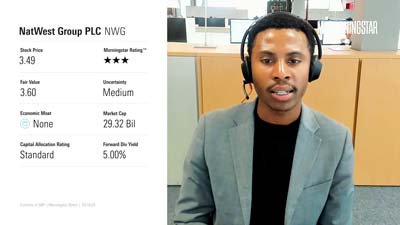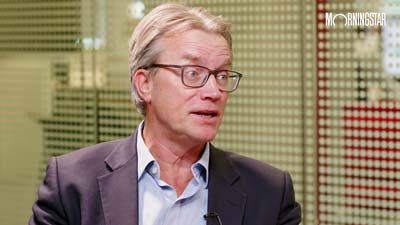Christopher Johnson: Hello, my name is Christopher Johnson, and today, I'm joined in the studio by Tineke Frikkee, Head of UK Equity Research at Waverton.
Tineke, thank you so much for being here with me.
Tineke Frikkee: It's a pleasure.
Johnson: U.K. inflation has fallen. The ONS recently came out with data suggesting that the U.K. economy escaped recession. So, are things turning around for the U.K. economy, in your opinion?
Frikkee: The short answer is we're getting there. I don't think we're quite there yet. Obviously, the last inflation number is about 3.4%. So yeah, much better than 10% or 11%. It's still above the 2% that the Bank of England targets. They think we're going to get there by the summer. We also – what the Bank of England will look at is that wage inflation because what's been unusual in the U.K. and in other countries is that employment has stayed very strong. So, there's not many unemployed people. There's lots of vacancies around and that means that wage inflation has been quite high. So that's been running at about 6%, which is too high. Ideally, it will be a little bit – for us it will be just above our cost of living. So, that's still a bit too high.
And also, in order for the U.K. to get back on this track, we need to have economic growth again, right? And we're flatlining. We are doing better than some other countries in terms of – I think we had one quarter of negative growth. But flatlining isn't good enough, right? So, we need to start growing again. And that might take a little bit longer because if we're running at full employment, where's growth going to come from? And that might have to come from trade and from other things. So, it's less difficult than it was. But I think we're sort of not quite there yet.
Johnson: Reports show that Brexit has been particularly harmful to the U.K. But have we experienced the worst of it and are better days to come?
Frikkee: Whenever trade gets disrupted, it has an impact on the economy. And what we've seen – and clearly, we've had some pain, but what we've seen that many of the trade agreements have just been rolled over to how they were when the U.K. was part of Europe. So, the number of new trade agreements haven't been that much. I've counted three. I might have missed some. So, we've got one with Australia. We've got one with New Zealand. And we've got a Trans-Pacific Agreement with Australia and New Zealand in it again, but Japan and Singapore are there. The big ones, the U.S. hasn't. So, my sense is that we're still on that journey.
Johnson: We're also in a very pivotal election year. How do you think either a Labour win or a Conservative win could impact the economic growth and the production of these trade deals that you're referring to?
Frikkee: Everything we hear from politicians we need to take with a slight grain of salt because it is pre-election talk. What we're hearing from Labour is that they're not looking to do anything dramatically different. I think we hopefully have heard from the huge political upheaval around the brief trust period. And also, from a business point of view, really what we want is stability and consistency and a long-term strategy rather than a chop and change. So overall, it feels a bit similar, but the proof is in the pudding. We'll find out what happens after the election. And when we talk with companies, so utility companies, for example, they seem to say that on balance Labour might want to push the energy transition a touch faster. We're hearing from house builders that maybe Labour is a bit more lenient to make the whole planning process smoother and quicker. But again, this could be pre-election talk.
Johnson: And what policies would you welcome to boost that growth?
Frikkee: Well, we can compare and contrast a little bit. So, if I, for example, think about infrastructure investment, we have the U.S. pumping trillions in grid modernization, doing more manufacturing locally. It's a huge package that seems to last for a number of years. A lot of that comes from tax incentives. So, you apply and then you can deduct some tax. In the U.K., there is a commitment to go to net zero. But it seems to be very project by project. So, there might be a sponsorship for a battery factory. It's very piecemeal rather than let's get a big plan out. And it's because we're in a different state from a budget point of view. Because you need to have the money to spend it. The U.S. economy is growing, so that helps. But this sort of piecemeal strategies I think makes it very difficult for businesses to say, right, I'm going to go to the U.K., they can go to the U.S.
Johnson: AstraZeneca is your top holding at 9.02%. So why are you so bullish on the pharmaceutical company and how has it driven the performance of the Waverton UK Fund?
Frikkee: AstraZeneca is a big company. So, the benchmark of my fund is MSCI UK and AstraZeneca is 7% in that. So, in order to – I want to outperform the market. So, I need to make a positive bet on stocks that I think will outperform. So, a 2% bet is not actually my biggest bet. Also saying that I can't go above 10%. But typically, my big bets would be 3% to 4% overweight. So yes, I am positive on AstraZeneca. And it's really because it's a growth company. One of the things that we don't have that much of in the U.K. are companies that can grow. So, this is a pharmaceutical company that can grow their sales about 8% to 10% over the next, say, 3 to 5 years, earnings at 15%. And we think it's cheap as a P/E of 16. It also does that – it is pure pharma, but it does it in a quite diversified way. So, it's not dependent on one big blockbuster drug that at some point will cease to exist. It's sort of big in oncology, but also respiratory, cardiovascular. So, lots of different therapeutic indications. And then it's nicely diversified across geographies. It is big in the U.S. Most need to be big in the US. But it probably has a lot more sales in emerging markets, particularly in China. So, we think they're exposed to different regulatory regimes which reduces risk.
Johnson: AstraZeneca has just acquired fusion pharmaceuticals. What's your view on this acquisition?
Frikkee: It probably is the first time that they've gone more into radiotherapy. However, they're big in oncology. So, it fits in oncology. So, they would sell to the same specialists. So, that's a tick in the box. It also fits in this strategy that Astra is not unique in and luckily for all of us, pharmaceuticals is moving more and more into targeted precision medicine. And this acquisition is exactly that because a lot of radiation actually damages a lot of tissue outside the cancer. So, the less damage you have outside that, the better for a patient. So, it also fits into that. So, this is sort of the next generation components that go into radiotherapy.
Johnson: What do you say to some people who question whether we can justify investing in companies like Shell, BP when we need to prioritize the green transition because of the impact of climate change? What would you say to those people that have concerns?
Frikkee: Ultimately, we need these companies to change in order to have an energy transition. They have a lot of money. They have a lot of skills in complex long-term projects. So, a lot of those sort of new energy projects fall in that camp. And we can't turn the switch and turn fossil fuel off. So, we need it to be phased out, absolutely. We do need gas to get coal out first. So, that sort of needs to be there for a certain time. The way we look at this, that we want to influence Shell. So, we want to – I mean, I had a meeting last week with the chair of the remuneration committee about how they dealt with some fatalities but also with the emission. We want to be at the table.
Johnson: You've sold over 109,000 and 67,000 shares in Spirent Communications plc and BP plc, respectively. So, what has driven the sell-off?
Frikkee: Spirent got bought. So, it got bid for. A private equity funded technology business bought it. The board says we like this. We thought that the likelihood of a new bid was very unlikely. So, we sold it on the day because the shares moved. It was bought at around 60% higher price. So, we thought, thank you very much. So, we took that and moved on to another investment. So, that's a very specific story.
BP is – the number of shares always looks higher, but BP is much bigger company than Spirent. It's partly because we had outflows and it's really to more firmly express our preference for Shell. Shell is the leader in gas, the leader in LNG. We talked about gas a lot. Overall, gas is a temporary solution, but we need it now to get coal out of the world as fast as possible. So, we really think Shell can play a bigger role in that.
Johnson: You've also added 16,000 shares to Compass Group. So, why have you done that?
Frikkee: You really do your homework very good. So, Compass Group, for those who don't know, is a contract caterer. So, anyone who has kids at schools and their school meals, Compass might be in the kitchen, or in your office block. I know I used to work somewhere where there's a Compass kitchen. Anyway. So, they make 75% of profits in the U.S. We spoke about the U.S. earlier. We're quite optimistic that the U.S. economic will continue going. So, we like to have a company to have exposure to that. So, Compass has that. They're the leader in what they do. Now Compass does food catering. So, you can imagine they have a huge food buying group and that gives you economy of scale. So, all their competitors wish they had margins like that. So very well positioned in the U.S. What's also very interesting is that – we talked about inflation at the start – is that during this high food inflation and wage inflation period, what we're seeing is that a lot of organizations and businesses in the U.S. but also in Europe kind of said, you know, this is really difficult to keep managing our own catering in-house. So, what we're seeing is sort of a step up in outsourcing. So, more universities, hospitals, nursing homes kind of said, you know what, this is just too complex. I'll let someone else do that. So, we're seeing more first-timers in signing contracts. So that means that the pie has just gotten bigger. And we think that has just meant that the growth has just stepped up.
Johnson: Tineke, thank you so much for joining me today.
Frikkee: It's a pleasure.
Johnson: This is Christopher Johnson for Morningstar U.K.




























